#Assembly Housing Committee
Explore tagged Tumblr posts
Text
Relating to the Honourable Tom Uren AC
Forty years ago this month, a major and challenging event happened in my life. It involved the Honourable Tom Uren AC. This is the story of my relationship with Uren during 18 months of my working life. Legend, charismatic hero, champion. These are just some of the words used in the media to describe The Honourable Tom Uren AC after he died on 26 January 2015. Born on 28 May 1921 in the then…

View On WordPress
#ACT Commissioner for Housing#ACT House of Assembly#Committee of Inquiry into Homelessness in the ACT#Community housing#Hazel Hawke#Minister for Territories and Local Government#Public housing#Radio 2CC#Scapegoat#The Canberra Times#The Honourable Tom Uren AC
0 notes
Text
When I caught up with Elizabeth Warren, the senior Democratic senator from Massachusetts, by telephone on Wednesday evening, it seemed like she didn’t know whether to laugh or scream. Hours earlier, Donald Trump had caved to pressure from the financial markets and announced, via social media, a ninety-day pause on many of his tariffs. On Wall Street, stocks shot up. Later in the afternoon, Warren, who sits on the Senate finance and banking committees, had spoken from the floor of the upper chamber, where she demanded an independent investigation into whether Trump had manipulated the markets to benefit Wall Street donors. (Anybody who had known about the policy pivot in advance could have made a fortune buying stocks or stock futures.) But while, in her floor speech, Warren had bristled with righteous anger at the idea of Trump, or anyone else at the White House, tipping off rich friends, during our conversation she couldn’t stop herself from chortling at the Administration’s claim that the President’s reversal had been the product of an artful negotiation strategy. “No serious person believes that, and I can’t even find an unserious person who believes it,” she joked. “The tariffs are on; the tariffs are off. The tariffs are on; the tariffs are off. Donald Trump is playing the biggest game of Red Light Green Light since ‘Squid Game.’ ”
Since Trump’s return to the White House, his chaotic style of governing has often seemed to catch Democrats off balance, and deprived them of a stationary target. Warren, however, has been on the offensive throughout. Unlike Bernie Sanders and Alexandria Ocasio-Cortez, who have joined forces for a “Fighting Oligarchy” tour, she hasn’t been barnstorming around the country. (Although, as part of the mass “Hands Off!” protests last weekend, she did speak to a large crowd in Nashville.) But Warren has been busy in Washington. In February, when a team from Elon Musk’s DOGE gutted the Consumer Financial Protection Bureau (C.F.P.B.), which she was the primary figure in founding, she denounced the attack as illegal and joined a street protest by the agency’s staff. More recently, Warren has broadened her critique of Trump’s policies to encompass other areas, including trade, taxes, financial regulation, and the debilitating effect of his over-all blitzkrieg. “Chaos is its own tax on the economy,” she said to me. “No business wants to plunk down the millions of dollars it takes to build something, or assemble a team, if they don’t know what the rules will be next week, much less next year. The only consistent theme is chaos, and no one can plan against chaos.”
Warren, who has long been a leading voice on the progressive left, is part firebrand and part policy wonk. During the run-up to the great financial crisis of 2008, when she was a professor at Harvard Law School, she cautioned, in speeches and blog posts, about the dangers of financial deregulation and Wall Street greed. After becoming a senator, in 2012, she focussed on soaring inequality, and, in 2020, when she ran for President, she proposed an annual wealth tax on the top 0.01 per cent. Even before last week, when Trump announced his blanket tariffs and brought the United States to the brink of another financial crisis, Warren was warning about the dangers that Trumponomics posed, including the likelihood that it would plunge the U.S. economy into a recession. “Look, this is the dumbest financial crisis in U.S. history,” she told me in an interview on Wednesday morning, shortly before Trump did his about-face. “Unlike earlier crises caused by viruses or subprime mortgages, this is one man who woke up with a crazy idea and imposed it on the world. But the tariff crisis is layered onto other ways in which he is weakening the economy.”
On a new Substack newsletter that Warren launched on Friday, in conjunction with other Democrats on the Senate Banking Committee, she highlights some of the Trump policies that she sees as particularly pernicious, including efforts to weaken financial deregulation, Musk’s slash-and-burn tactics at key federal agencies, and the pursuit by Republicans in Congress of a highly regressive tax policy that could well force spending cuts which could rip up the social safety net. “Lights are flashing red, but it is not too late,” Warren writes. “We still have time to prevent economic calamity for American families if we act quickly.”
Since coming to office, Trump has appointed new regulators—or, rather, deregulators—at many of the nation’s oversight agencies: the Securities and Exchange Commission, the Federal Reserve, the Office of the Comptroller of the Currency, the Commodity Futures Trading Commission, the Federal Trade Commission, and the C.F.P.B. To Warren, this is a recipe for disaster. “The lesson we should have learned from 2008 is that if the regulatory players don’t do their jobs in enforcing the laws and overseeing large financial institutions, these institutions will go for profit every time and load risk into the system,” she told me. In February and March, the shell of the C.F.P.B., where Treasury Secretary Scott Bessent is now the acting director, dropped more than half a dozen enforcement cases. In one of them, the agency had accused the bank Capital One of cheating customers out of two billion dollars by misleading them about interest rates offered on its savings accounts. In another, it had accused three big banks—JPMorgan Chase, Wells Fargo, and Bank of America—of failing to protect their customers from rampant fraud on Zelle, a payments platform in which they have ownership stakes.
In our conversation, Warren underscored that the Republican desire for tax cuts seems to know no bounds. “Even in the middle of this chaos, they are moving forward on a bill that has trillions of dollars in giveaways to corporations and billionaires, and cuts the underlying investment in working families,” she said. “That’s a terrible idea in the best of economic times, but it will be a complete disaster at a time when more American families are coming under financial stress.”
The struggle over taxes and spending seems set to dominate the legislative agenda on Capitol Hill until the end of the year. But, for the moment, Warren is focussed on Trump’s tariffs. Even though some are now lower than they were at the start of the week, they are all still very much in place. (For most goods from China, the import duty is now a hundred and forty-five per cent. Autos, auto parts, steel, and aluminum face rates of twenty-five per cent, as do many other goods from Canada and Mexico. Items from most other countries are subject to a rate of ten per cent.) The policy debate about how far the federal government should go to protect manufacturing jobs remains heated. Even as elected Democrats have lambasted Trump for panicking investors and tanking the markets, some of them, particularly in industrial states such as Michigan and Pennsylvania, have joined the United Auto Workers union in expressing support for at least some of Trump’s tariffs.
When I asked Warren what stance Democrats should adopt on tariffs, she marked out a middle ground, describing them as “an important tool in the economic toolbox,” but arguing that they should be introduced only in certain situations and industries. “If you get sick, and fill your prescription in America, there’s a ninety-per-cent chance that the drug was manufactured overseas, probably in Asia, and the materials for it probably came from China,” she said. “That’s a dangerous place for our country. If we got into a back-and-forth with a couple of countries, suddenly there’s no antibiotics for heart medication.” Warren argued that the keys to employing tariffs successfully are targeting them on goods that have strategic value, using them in conjunction with other policies designed to encourage production in the United States, such as subsidies, and introducing them gradually so that businesses and investors can plan for them. This was the approach of the Biden Administration, and Warren pointed out that it is very different from what Trump is doing. “Imposing tariffs on virtually every country for virtually every product sent to the United States, at rates that seem to be randomly pulled from a bingo cage, is not a way to strengthen America’s economy,” she said. “And it is certainly not a way to attract long-term investment and good jobs to the United States.”
But with Trump and the Republicans holding power in Washington, what can the Democrats do? Warren insists that, at least when it comes to Trump’s blanket tariffs, they are far from powerless. In introducing these levies, which it falsely described as “reciprocal,” the White House invoked the International Emergency Economic Powers Act, of 1977, which gave the President the authority to introduce broad tariffs during a national emergency. “But we are not in an emergency right now with Belgium or South Korea,” Warren pointed out. “That same law gives Congress the power to pass a resolution and say, ‘Nope. No emergency here,’ and roll back the entire tariff authority that Trump is using.”
On Thursday, as the stock markets fell again, Warren, together with her colleague Ron Wyden, of Oregon, introduced a piece of legislation that would do just that. Four Democrats and one Republican—Rand Paul, of Kentucky—joined them. With only forty-seven seats, Democrats seem unlikely to get the votes that they need for the bill to make it out of the Senate, especially now that Trump has announced his timeout. But Warren insists that bringing the legislation to the floor is still worthwhile because Republicans will be forced to vote on it. She said, “They will have to declare for everyone to see: Are they still simply Donald Trump’s suck-ups? Or are they legislators who will exercise independent judgment to protect the people and the economy of the United States?”
Warren surely knows the answer to her questions, which may explain, in part, her enthusiasm for the bill. When I spoke with her for a second time, after Trump’s reversal, she insisted that it was now more important than ever. “Trump demonstrated again that his whims will determine tariff policy for the entire world,” she said. “That will be true right up until Congress says no. Our resolution is the no.”
261 notes
·
View notes
Text
BAD CALIFORNIAN INTERNET BILLS
While it is good that KOSA is now dead in the House (for now) I would like to ask for people's attention on AB1949 and SB976, which could push for Age verification by showing your ID.
There was a third bill named AB3080 that had similar goals, but luckily it received revisions so it is no longer a threat or require ID verification to access websites. So it would be possible to get AB1949 and SB976 to be revised so they aren't dangerous anymore.
You can read the text for AB1949 right here
AB1949 doesn't explicitly ask for ID verification anymore, as it used to, due to a revision, but there is a provision stating if they deem a website "willfully disregards" the age of the user they will be deemed to have actual knowledge of the user's age.
This broad part could be left to abuse, which is why it needs to be revised before passing, in order to confirm ID verification is not required. FIND YOUR REPS HERE!
For AB1949, you can find your Senate representative with the link above as I said, and check to see if they're a member of the CA Senate Appropriations Committee. Then call them to tell them you oppose this bill. Try to add reasons you think this bill would negatively affect California financially because that's what this committee focuses on.
As for SB976, which you can read here
Its goal is to "keep kids off social medias and addictive feeds" But the concerning part is that "it would make it unlawful for the operator of an addictive internet-based service or application, as defined, to provide an addictive feed to a user, unless the operator does not have actual knowledge that the user is a minor; commencing January 1, 2027, has reasonably determined that the user is not a minor; or has obtained verifiable parental consent to provide an addictive feed to the user who is a minor."
How are you supposed to know that you have "verifiable parental consent" without ID and age verification of both parents and child?Even then, holding the ID of a minor feels pretty illegal given how sensitive how an info this is, in case of a data breach (which will happen) this would endanger kids even more, and no one in general want to give their ID to access a website or an app.
The bill would also make it unlawful for a website or app to send notifications to a minor according to a certain timeframe.
For SB976, find your Assembly representative using the link below and check to see if they're a member of the CA Assembly Appropriations Committee. Then call them to tell them you oppose this bill. https://apro.assembly.ca.gov/members
You can tell them how this is terrible for privacy, and the safety of children, and that it would be terrible for the economy of California, as they seem to focus on it. You can try sending faxes for either bills, but calling IS MUCH MORE efficient. https://faxzero.com/
Here is the time schedule, bills must be taken care before the end of August so it is a matter of time crunch:

You may use the following scripts for the respective bills, you can try to trim it if you deem it too long!

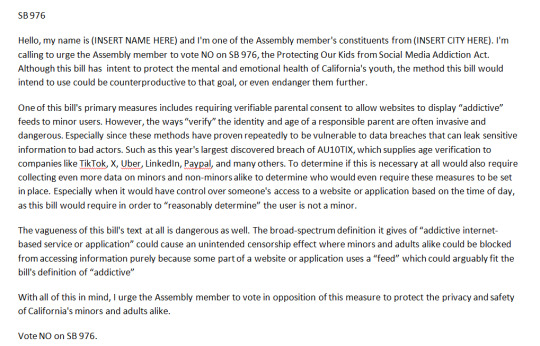
Might be worth a shot to contact Gavin Newsom (Californian governor) here to voice your concerns for these bills
345 notes
·
View notes
Note
how do ml's reconcile with lenin going for a bigbrainhaver hierarchy which just so happened to place him at the tippy top? most of the things he's quoted for writing make a kind of sense in that longwinded academic philosopher way, but, like, russia went from having a revolution against monarchy to having a monarchy, essentially, and what folks do tends to align with their desires, yeah? wouldn't that make everything he said, idk, suspicious?
we reconcile with this because none of this is even remotely true. lenin did not 'happen to be placed at the tippy top' but was in fact elected by the soviets, who worked in a very simple electoral system by which workers and peasants would elect representatives to their local soviet, who as well as administering local services would also elect members to higher bodies. the quote unquote bigbrainhaver hierarchy system in question was as follows:
The sovereign body is in every case the Congress of Soviets. Each county sends its delegates. These are elected indirectly by the town and county Soviets which vote in proportion to population, following the ratio observed throughout, by which the voters in the town have five times the voting strength of the inhabitants of the villages, an advantage which may, as we saw, be in reality three to one. The Congress meets, as a rule, once a year, for about ten days. It is not, in the real sense of the word, the legislative body. It debates policy broadly, and passes resolutions which lay down the general principles to be followed in legislation. The atmosphere of its sittings is that of a great public demonstration. The Union Congress, for example, which has some fifteen hundred members, meets in the Moscow Opera House. The stage is occupied by the leaders and the heads of the administration, and speeches are apt to be big oratorical efforts. The real legislative body is the so-called Central Executive Committee (known as the C. I. K. and pronounced "tseek") . It meets more frequently than the Congress to which it is responsible-in the case of the Union, at least three times in the year-passes the Budget, receives the reports of the Commissars (ministers), and discusses international policy. It, in its turn, elects two standing bodies: (1) The Presidium of twenty-one members, which has the right to legislate in the intervals between the sittings of the superior assemblies, and also transacts some administrative work. (2) The Council of Peoples' Commissars. These correspond roughly to the Ministers or Secretaries of State in democratic countries and are the chiefs of the administration. Meeting as a Council, they have larger powers than any Cabinet, for they may pass emergency legislation and issue decrees which have all the force of legislation. Save in cases of urgency, however, their decrees and drafts of legislation must be ratified by the Executive Committee (C.I.K.). In another respect they differ from the European conception of a Minister. Each Commissar is in reality the chairman of a small board of colleagues, who are his advisers. These advisory boards, or collegia, meet very frequently (it may even be daily) to discuss current business, and any member of a board has the right to appeal to the whole Council of Commissars against a decision of the Commissar.
—H.N. Brailsford, How The Soviets Work (1927)
you might notice that the congresses of soviets were not directly elected -- this is because they were elected by local soviets, who were directly elected, in a process that many people have given first hand accounts of:
I have, while working in the Soviet Union, participated in an election. I, too, had a right to vote, as I was a working member of the community, and nationality and citizenship are no bar to electoral rights. The procedure was extremely simple. A general meeting of all the workers in our organisation was called by the trade union committee, candidates were discussed, and a vote was taken by show of hands. Anybody present had the right to propose a candidate, and the one who was elected was not personally a member of the Party. In considering the claims of the candidates their past activities were discussed, they themselves had to answer questions as to their qualifications, anybody could express an opinion, for or against them, and the basis of all the discussion was: What justification had the candidates to represent their comrades on the local Soviet. As far as the elections in the villages were concerned, these took place at open village meetings, all peasants of voting age, other than those who employed labour, having the right to vote and to stand for election. As in the towns, any organisation or individual could put forward candidates, anyone could ask the candidate questions, and anybody could support or oppose the candidature. It is usual for the Communist Party to put forward a candidate, trade unions and other organisations can also do so, and there is nothing to prevent the Party’s candidate from not being elected, if he has not sufficient prestige among the voters. In the towns the “ electoral district ” has hitherto consisted of a factory, or a group of small factories sufficient to form a constituency. But there was one section of the town population which has always had to vote geographically, since they did not work together in one organisation. This was the housewives. As a result, the housewives met separately in each district, had their own constituencies, and elected their own representatives to the Soviet. Here, too, vital interest has always been shown in the personality of every candidate. Why should this woman be elected ? What right had she to represent her fellow housewives on the local Soviet ? In the district next to my own at the last election the housewife who was elected was well known as an organiser of a communal dining-room in the district. This was the kind of person that the housewives wanted to represent them on the Soviet. Another candidate, a Communist, proposed by the local organisation of the Party, was turned down in her favour.
[...]
The election of delegates to the local Soviet is not the only function of voters in the Soviet Union. It is not a question here of various parties presenting candidates to the electorate, each with his own policy to offer. The Soviet electorate has to select a personality from its midst to represent it, and instruct this person in the policy which is to be followed when elected. At a Soviet election meeting, therefore, as much or more time may be spent on discussion of the instructions to the delegate as is spent on discussing the personality of the candidates. At the last election to the Soviets, in which I personally participated, we must have spent three or four times as much time on the working out of instructions as we did on the selection of our candidate. About three weeks before the election was to take place the trade union secretary in every department of our organisation was told by the committee that it was time to start to prepare our instructions to the delegate. Every worker was asked to make suggestions concerning policy which he felt should be brought to the notice of the new personnel of the Moscow Soviet. As a result, about forty proposals concerning the general government of Moscow were handed in from a group of about twenty people. We then held a meeting in our department at which we discussed the proposals, and adopted some and rejected others. We then handed our list of pro¬ posals to a commission, appointed by the trade union committee, and representing all the workers in our organisation. This Commission co-ordinated the pro¬ posals received, placed them in order according to the various departments of the Soviet, and this co-ordinated list was read at the election meeting itself, again discussed, and adopted in its final form.
—Pat Sloan, Soviet Democracy (1937)
Between the elections of 1931 and 1934, no less than 18 per cent of the city deputies and 37 per cent of village deputies were recalled, of whom only a relatively small number — 4 per cent of the total — were charged with serious abuse of power. The chief reasons for recall were inactivity — 37 per cent — and inefficiency — 21 per cent. If these figures indicate certain lacks in the quality of elected officials, they show considerable activity of the people in improving government. The electorate of the Peasants' Gazette, for example, consisted of some 1,500 employees, entitled to elect one deputy to the Moscow city soviet and two to the ward soviet. For more than a month before the election every department of the newspaper held meetings discussing both candidates and instructions. Forty-three suggested candidates and some 1,400 proposals for the work of the incoming government resulted from these meetings, which also elected committees to boil down and classify the instructions. These committees issued a special four-page newspaper for the 1,500 voters; it contained brief biographies of the forty-three candidates, an analysis of their capacities by the Communist Party organization of the Peasants' Gazette, and the "nakaz," or list of "people's instructions," classified by subject and the branch of government which they concerned. At the final election meeting of the Peasants* Gazette there was literally more than 100 per cent attendance, since some of the staff who for reasons of absence or illness had not been listed as prospective voters returned from sanatoria or from distant assignments to vote. The instructions issued by the electorate in this manner — 1,400 from the Peasants' Gazette and tens of thousands from Moscow citizens — became the first business of the incoming government.
—Anna Louise Strong, The New Soviet Constitution (1937)
does this mean that the soviet project was some utopian perfect system? no. there were flaws in the system like any other. it disenfranchised the rural peasantry (although not, i would like to add, to any extent greater or even equivalent to the extent to which the US electoral system disenfranchises the urban working class) -- the various tiers of indirect selection created a divide between the average worker and the highest tier of the executive -- and various elements of this fledgling system would calcify and bureaucratise over time in ways that obstructed worker's democracy. but saying that it was 'a monarchy' is founded in absolutely nothing except the most hysterical anticommunist propaganda and tedious orwellian liberal truisms.
even brailsford, in an account overall critical of the soviet system, had to admit:
Speaking broadly, the various organs of the system, from the Council of Commissars of the Union down to the sub-committees of a town Soviet, are handling the same problems. Whether one sits in the Kremlin at a meeting of the most august body of the whole Union, the "C.I.K.," or round a table in Vladimir with the working men who constitute its County Executive Committee, one hears exactly the same problems discussed. How, be-fore June arrives, shall we manage to reduce prices by ten percent? What growth can we show in the number of our spindles, or factories, and in the number of workers employed? When and how shall we make our final assault on the last relics of illiteracy? Or when shall we have room in our schools, even in the remotest village, for every child? Was it by good luck or good guidance that the number of typhus cases has dropped in a year by half? And, finally, how can we hasten the raising of clover seed, so that the peasants who, at last, thanks to our propaganda, are clamoring for it, may not be disappointed?
—H.N. Brailsford, How The Soviets Work (1927)
genuinely, i think you should take a moment and think about where you learned about the soviet union. have you read any serious historical work on the topic, even from non-communist or anti-communist sources? because even imperialist propagandists have to make a pretence at engaging with actual facts on the ground, something which you haven't done at all -- and yet you speak with astounding confidence. i recommend you read some serious books instead of animal farm and reflect on why you believe the things you believe and how you know the things you think you know.
1K notes
·
View notes
Text
Indigenous Services Minister Patty Hajdu and Assembly of First Nations National Chief Cindy Woodhouse Nepinak are urging MPs across party lines to support legislation to ensure First Nations have clean drinking water in their communities. The government has put forward a bill that seeks to do just that, and also seeks to protect source-water on First Nations territories. Hajdu has called it the first piece of truly co-developed legislation between Canada and First Nations — even though some First Nations disagree with that framing. The bill has been before a House of Commons committee for months, where MPs have heard chiefs and experts raise concerns that the legislation does not go far enough to protect their rights. They also question how robust it will be in ensuring their communities receive adequate funding to maintain and operate water treatment plants.
Continue Reading
Tagging: @newsfromstolenland
#first nations#indigenous#drinking water#clean drinking water#cdnpoli#canadian politics#canadian news#canada
125 notes
·
View notes
Text
[ 𓆩♡𓆪 ] for you... maybe — cedar height's student council!


[ SYNOPSIS ] ━━ you and woonhak are in different friend groups, different classes, different social bubbles, but always find yourselves in the same place: the student council’s shared committee space. why? because the two of you and your friends somehow all, coincidentally, represent the student body despite all their hidden crazy. woonhak? doesn’t really care. you? cares a bit too much. disaster? abso-fucking-lutely. well your respective friends are very much over it. yeah, they all see what’s going on. all the bickering, the accidental eye contact, the weird tension when you’re both stuck doing posters together at 10pm. so they form an unofficial matchmaking pact. but because both sides can’t really rein in their chaos for shit, the plans are anything but smooth.


.・。.・゜✭・. PRESIDENT ━━ Yoo Jimin ✼ the highest authority ✼ oversees the entire council ✼ makes executive decisions ✼ the face of the student body. .・。.・゜✭・. VICE PRESIDENT ━━ Park Sungho ✼ second-in-command ✼ supports the president ✼ steps in when president is unavailable ✼ helps manage internal coordination. .・。.・゜✭・. SECRETARY ━━ Shin Yuna ✼ handles all documentation ✼ takes down meeting notes ✼ oversees official communication ✼ in charge of scheduling. .・。.・゜✭・. TREASURER ━━ Hong Eunchae ✼ manages the budget ✼ organizing and overseeing fundraising activities ✼ allocates funds for events ✼ approves spending. .・。.・゜✭・. LOGISTICS LEAD ━━ Yang Jungwon ✼ coordinates operations and timelines ✼ ensures everything runs smoothly behind the scenes ✼ works closely with the president and event team. .・。.・゜✭・. HEAD OF EVENTS ━━ Hwang Y/N ✼ leads the planning and execution of all major school events ✼ develop and implement publicity strategies for events ✼ creative force + people wrangler. .・。.・゜✭・. HEAD OF ACTIVITIES ━━ Lee Chanyoung ✼ organizing and facilitating inter-house and year-level sporting competitions ✼ maintaining school spirit through extracurriculars. .・。.・゜✭・. SPIRIT COORDINATOR ━━ Myung Jaehyun ✼ leads pep rallies, spirit weeks, and anything hype-related ✼ voices the interests and concerns of the student body ✼ keeps morale up. .・。.・゜✭・. ASSEMBLY LIAISON ━━ Han Dongmin ✼ plans and runs student assemblies ✼ public speaking overseer ✼ makes announcements fun (or dramatic). .・。.・゜✭・. OUTREACH CHAIR ━━ Lee Sanghyuk ✼ connects with external partners (clubs, local businesses, parent orgs) ✼ promotes inclusivity ✼ encourages student participation. .・。.・゜✭・. DESIGN COORDINATOR ━━ Kim Donghyun ✼ in charge of visual branding, posters, event promo, and decor aesthetics ✼ overseeing the design process for various projects ✼ permanent subscription to canva. .・。.・゜✭・. CO-DESIGN CHAIR ━━ Kim Woonhak ✼ right-hand to the design coordinator ✼ brings the ✨extra flair✨ ✼ often the chaotic creative type who makes the visuals pop.

[ A. NOTE ] ━━ not much to say over here except that HERE YOU GO! these are the student leaders/nerds/agents of chaos in this story! they’re a bunch of fairly smart and responsible idiots that just so happened to get into the stuco. let’s just say all of them being friends and being in the stuco is NAWT a coincidence,, fate brought them together really (read: everyone else BUT y/n and woonhak ran for their positions cuz those two just got dragged in but only one of them took their new responsibility seriously). so yep. their social media profiles will be posted soon?? 🔜 hopefully i don’t get too lazy. like and comment yall! byeeeeekslsks&/₱)-):
[ TAGLIST ] ━━ (open) @s0shroe @kazukazukiiii @beomev @sfnctzen @tempewra @aeminju @wondoras @mensisim @person-line @g3laatin @jungwonbropls
#boynextdoor#boynextdoor x reader#fanfiction#kpop#nujins#boynextdoor fluff#boynextdoor smau#woonhak#leehan#taesan#riwoo#myung jaehyun#boynextdoor imagines#boynextdoor fanfic#social media au#leehan x reader#jaehyun#bnd#myung jaehyun x reader#woonhak x reader#riwoo x reader#sungho x reader#boynextdoor x y/n#boynextdoor x you
56 notes
·
View notes
Text

June's 2024 Pride Month is fast approaching in Thailand, so I thought now would be the perfect time to explain the Thai legislative process and what the future of the Marriage Equality Bill looks like:
How Does A Bill Become Law in Thailand? I'm going to explain it as simple as possible. A bill is always first introduced into the National Assembly. The National Assembly is broken down into two houses: you have the lower house (House of Representatives) and the upper house (Senate). First, the bill goes through consideration in the lower house and there's three separate readings. Once it gets approved on its third reading, it's then sent to the upper house where it has to go through the same process. Again, it goes through three separate readings. Then if it's approved on its third reading, the PM (Prime Minister) sends it to the King for royal approval. If the King signs the bill, it'll become law once it is published in the Royal Gazette.
At What Point in the Process is the Marriage Equality Bill? In April, the Senate voted "Yes" to accept the bill for consideration. A committee will be formed to consider the bill in its second reading--which will not happen until July. So, really we're just waiting because the current senatorial term ends early this month... Unfortunately, given the timeframe of how the process works, the bill was never going to be realistically passed by Pride 2024. It is a little bit disappointing, but there's still lots to celebrate. Thailand is seeking to host the World Pride Events in Bangkok by 2028...So there is a lot to look forward to, regardless. (Best case scenario*, marriage equality will be legal by November 🤞🏾🤞🏾🤞🏾)
What Will Happen during the Second Reading in the Senate? The second reading is where things get a little more complicated. This is probably the biggest hurdle to overcome for the bill to be passed as quickly as possible. Once the committee is appointed, they'll be going through the bill section by section. Any amendments that were proposed from the lower house, which this go around is mostly just about equal representation in the language of the bill, will be considered (Consideration cannot exceed 30 days). The hope is that all 27 members of the committee will vote to agree with the amendments and then the bill will be revised as such. However, at this stage, if the committee cannot come to a full agreement, then the amendments must be debated. During debate, if the majority approve the amendments, the text is revised and the bill moves on to the third reading. If the bill is withheld, meaning the Senate doesn't agree to any of the amendments, it goes back to the lower house for reconsideration.
What Happens if the Bill is Presented for Reconsideration in the Lower House? The lower house can agree and approve the bill as is. But if the lower house does not agree with the Senate's decision or if the Senate has proposed amendments that the lower house does not agree with, then the two houses must form a joint committee that will work to resubmit an agreed upon version of the bill. From there, my knowledge is pretty limited, but I know due to the numbers from the houses initial votes, the bill would eventually be approved by a combination of votes from both houses.
What Happens during the Third Reading in the Senate? During the third reading of the bill, the Senate must decide whether to enact the bill as law or not. They're not allowed to change anything on the bill and they cannot debate any of the amendments. It's just: here's the bill, it's being presented as it's been approved by the second reading, should it be passed as law or not? One more than the majority of the vote is needed in the upper house in order for the bill to be approved.
What Happens if the Senate Votes "No" on the Bill? The bill can be reintroduced into the lower house after 180 days. If the lower house votes to approve the bill that was presented in the third reading of the upper house (which they will), it basically bypasses the Senate's decision to not approve the bill. From there it'll go directly from the lower house to the PM... who will present it to the King for royal approval. Like I've been saying: the bill is eventually going to become law at some point. It's just a matter of when. Because if the Senate decides to make things difficult, then it would just take longer for the bill to pass. Since it's going to pass eventually, we want everything to go as smoothly as possible without any hiccups.
What is the Likelihood of the Senate Voting "Yes"? It's hard to give a definitive answer. The expectation is that, since they know the bill is going to eventually become law anyway, they're just going to do the decent thing and approve it so that they don't have to prolong things any further... because it's taken long enough at this point. The problem is that the upper house is more notoriously known as the conservative house of the National Assembly. And if you understand Thai and were paying attention to the discussions that were going on in their first reading, you can kind of see why that is. Unfortunately, there is a chance that they're going to want to make things more difficult... but I'm hopeful that they won't.
**UPDATE**: As of 18/06/24 the Senate has voted YES to approve the Marriage Equality Bill... which means it should be enacted into law by OCTOBER!!!
What Happens if the Senate Votes "Yes"? Once the National Assembly approves the bill, it goes to the King for approval. After the King receives the bill from the PM, he would have a period of twenty days from when he received it to sign it into law. Once it is signed, it is arranged for publication in the gazette. After 120 days from its publication, it is considered officially legal in Thailand.
**UPDATE**: The Royal Gazette has announced that the King has signed and passed the Marriage Equality Law which has been enacted as of 24/09/2024... the law will come into effect after 120 days!
Can the King Veto the Bill? He can...BUT the King's never used his veto once the National Assembly has approved a bill. In the extremely rare case that he does, the lower house would reintroduce the bill and the National Assembly would vote to bypass the King's veto anyway. The bill can then be sent directly to the gazette, with or without the King's signature, to be published into law.
*The best case scenario, overall, is that 1) the Senate votes to approve any and all amendments during the second reading and 2) in the third reading they vote to approve the bill in its amended form. Then the PM will present that bill to the King, it'll be signed, and then published in the gazette. And, that's it. Then you have marriage equality in Thailand. Officially!!!
❤️🧡💛💚💙💜
Marriage equality has been in talks for a while in Thailand, and a lot of us were frustrated when it didn't get passed the first few times around. Now that we know that it's going to be legal, I'm hopeful about what this could mean in the future: Gender recognition... full and equal protection under the law... I was 11 when I moved to the United States to live with my dad (I won't get into the reasons why, they're very personal) and ~11 years later, when marriage equality passed I could not express the amount of joy that had overcome me...and I was only 21 at the time, with no intention of being married in the near future. Yet, for some reason, I felt as though I could not be fully excited because things were so different back home. What I could have here, I could not have if I ever decided to move back to Thailand. That's not to say that Thailand is not very culturally accepting of the LGBTQIA+ community, because they are (for the most part), it's just that the laws have failed to keep up. Given my personal situation, which I don't typically feel comfortable sharing with people I don't really know, something as simple as being able to change my gender indicator on my Thai I.D. and my passport...those are things that can now be dreamt into reality. Whereas before, it was something that you couldn't even fathom being a discussion had marriage equality not been passed. It's just a really big deal and I'm happy to see that it's finally happening! ❤️
#marriage equality in thailand#marriage equality#thai politics#lovewins#i tried to explain to the best of *my* knowledge#it doesn't help that i get emotional whenever i talk about this#so#if i got something wrong...please let me know!#talk thai to me#hallowqueue 02.04.24
315 notes
·
View notes
Note
Writing an oc who's a prostitute? What's the job like? The measures they'll take? It might be lengthy, but stuff like virtual, brothel and escort work?
Writing Notes: Prostitution
Prostitution - the practice of engaging in relatively indiscriminate sexual activity, in general with someone who is not a spouse or a friend, in exchange for immediate payment in money or other valuables.
From the 1980s, the more neutral term sex worker was increasingly employed to describe those involved in commercial sex activities.
"Prostitute" and "sex worker" are shorthand for what is argued to be the more accurate term: “a provider of sexual services for material gain.”
“Pimp” - males who act as intermediaries between client and worker in the exchange of sexual services; he may or may not be in an additional relationship to the woman.
“Madam” - a female brothel-keeper.
The designations “pimp” and “madam” are charged terms. Their usage was common in some historic places and times.
Prostitution is a very old and universal phenomenon; also universal is condemnation of the prostitute but relative indifference toward the client.
Prostitutes may be female or male or transgender, and prostitution may entail heterosexual or homosexual activity, but historically, most prostitutes have been women and most clients men.
Prostitutes are often set apart in some way:
In ancient Rome they were required to wear distinctive dress;
under Hebrew law only foreign women could be prostitutes; and
in pre-World War II Japan they were required to live in special sections of the city.
In medieval Europe prostitution was licensed and regulated by law, but by the 16th century an epidemic of venereal disease and post-Reformation morality led to the closure of brothels.
International cooperation to end the traffic in women for the purpose of prostitution began in 1899.
In 1921 the League of Nations established the Committee on the Traffic in Women and Children, and in 1949 the UN General Assembly adopted a convention for the suppression of prostitution.
In the U.S. prostitution was first curtailed by the Mann Act (1910), and by 1915 most states had banned brothels (Nevada being a notable exception).
Prostitution is nevertheless tolerated in most U.S. and European cities.
In the Netherlands many prostitutes have become members of a professional service union, and in Scandinavia government regulations emphasize hygienic aspects, requiring frequent medical examination and providing free mandatory hospitalization for anyone found to be infected with venereal disease.
Prostitutes are very often poor and lack other skills to support themselves; in many traditional societies there are few other available money-earning occupations for women without family support.
In developing African and Asian countries, prostitution has been largely responsible for the spread of AIDS and the orphaning of hundreds of thousands of children.
It is difficult to generalize about the background or conditions of prostitutes because so much of what is known about them derives from studies of poorer and less-privileged individuals, people who are more likely to come into contact with courts and official agencies.
Much more is known about streetwalkers, for example, than about the higher-status women who can be more selective about their clients and work conditions.
Based on available studies, though, it is reasonable to assert that female sex workers often are economically disadvantaged and lack skills and training to support themselves.
Many are drawn at an early age into prostitution and associated crime, and drug dependency can be an aggravating factor.
They frequently are managed by a male procurer, or pimp, or by a supervisor, or madam, in a house of prostitution.
Health hazards to prostitutes include sexually transmitted diseases, some of which may be acquired through drug abuse.
Male prostitution has received less public attention in most cultures.
Heterosexual male prostitution—involving males hired by or for females—is rare.
Homosexual male prostitution has probably existed in most societies, though only in the 20th century was it recognized as a major social phenomenon, and its prevalence increased during the late 20th and early 21st century.
Prostitution during the Victorian age gained an unprecedented amount of attention from both British society and their government.
Although issues of prostitution were, and are often still, seen in black and white, there were many cases where prostitution was either a supplementary activity or the only available avenue of employment.
It was an unsavory profession, and, unfortunately, it was often considered a necessary evil.
However, it is important to note that although it was an activity highly frowned upon by upper class women in society, these same women were the first to rally to the cause of those “fallen women” that were being exploited by the government.
The popularity of issues concerning prostitution eventually lessened over time, but the resulting influences sparked by feminist movements involved in prostitute’s rights created a ripple effect that can be seen even today.
Working & Living Conditions. Key factors have shaped the working and living conditions of sex workers across the globe since the beginning of the 17th century.
These include the degree to which women were bound or “free”, or were able to exercise power in relation to employers and clients. Related to this is the location of individual women within the sex industry—where they existed within any particular hierarchy based on the class of clients, ethnicity, and so on.
Market forces have also been major determinants of the pay and working conditions in the sex industry. Shifts in the economy have impacted sex workers as well as other workers, affecting both the demand for sexual services and the supply of women willing to sell sex.
A third major influence on sex workers’ lives has been the responses to prostitution of the community in which they worked. This has included both informal and official responses which often determined where and how women could sell sex and under what circumstances.
The formation, expansion, and disintegration of nations and empires have had a similar impact on the market for sex and have contributed to official responses to prostitution.
Finally, developments in technology and medicine, especially since the early 20th century, have contributed to significant changes in the ways in which sexual services are delivered and also impacted the health of sex workers.
Prostitution is considered to be a profession of high mobility; it is almost tempting to say that probably every prostitute migrates at least once in her lifetime.
Despite this fact, the share of prostitutes in the flows over and across the continents has been widely neglected in migration studies.
Migration is thought to be a “basic condition of human societies” and “central to the human experience [and] the major forces for historical change.”
Nevertheless, many studies focus solely on the movements of European male settlers. In particular, labour migration was long held to be a male domain, keeping up the idea of males as breadwinners and the main actors in history.
Hoerder offers up the critique that migration studies emphasize “the westward flow of agrarian settlers and neglect [the] moves of workers and of women”
Changing places is a lifetime experience of women involved in the sex sector, and in many cases, they travel far more than people in other sectors.
The Social Profiles of Prostitutes. There is no shortage of media portrayals of prostitutes. Yet the images that inform our opinions regarding sex workers tend to be largely negative, depicting them as either criminals or as victims.
Today, the latter perception prevails: sex workers are stereotypically seen as:
young,
migrant girls with
no education and
no alternatives.
The most conspicuous types of prostitutes tend to be overrepresented, while those operating in private have largely been overlooked.
In addition to which, the “facts” about the sex workers represented in the sources may not always be entirely correct, as they might have told their interlocutors what they believed would best serve their needs, rather than what was true.
The social profiles of sex workers have changed considerably over the course of the last 400 years.
Prostitute populations have become more heterogeneous in terms of their origin, race, age, family situation, educational level, and professional background—albeit at different paces.
Example: Migrants did not suddenly appear in the western European sex trade after the fall of the Berlin Wall. Rather, they were always present, and always overrepresented in the prostitute population. What actually changed over time are the distances covered.
Similarly, prostitutes’ ages have altered in tandem with developments in society at large, most notably lengthier childhoods and a later start to working life.
While it is definitely true that certain people have limited options for survival, the high degree of diversity among sex workers clearly shows that prostitution cannot be reduced to a profession of the destitute, or one which people passively end up in.
In fact, people who are not members of so-called “vulnerable” groups might be more numerous in the sector than anticipated because of their invisibility.
The sex industry is highly stratified, and individuals with better prospects take the places at the top of the hierarchy more often than those with limited possibilities.
These women have chosen to use their bodies to create a financial surplus, and they are thought to face fewer dangers than the prostitutes working at the lower end of the market.
It seems easier for people to accept that these women actively chose their profession, and harder to view them as passive victims.
However, their underlying reasons are not necessarily different from the masses employed at the industry’s margins.
Although some women are forced into prostitution against their will one way or another, this is certainly not the case for all sex workers, let alone the majority.
Most prostitutes are driven by opportunity, and the fact that most have fewer opportunities than their contemporaries does not change that.
Simply put, prostitution can be emancipatory.
It can be a positive choice, rather than just a negative one.
Profile characteristics do not explain why people use their bodies to earn an income, but they do explain why certain people end up in the most visible and least rewarding sectors of the profession.
Brothel - a building in which prostitutes are available; bordello
Bordello - (somewhat literary) a building in which prostitutes are available
Public brothels were established in large cities throughout Europe.
At Toulouse, in France, the profits were shared between the city and the university; in England, bordellos were originally licensed by the bishops of Winchester and subsequently by Parliament.
Stricter controls were imposed during the 16th century, in part because of the new sexual morality that accompanied the Protestant Reformation and the Counter-Reformation. Just as significant was the dramatic upsurge of sexually transmitted diseases. Sporadic attempts were made to suppress brothels and even to introduce medical inspections, but such measures were to little avail.
By 1915 nearly all states had passed laws that banned brothels or regulated the profits of prostitution.
After World War II, prostitution remained prohibited in most Western countries, though it was unofficially tolerated in some cities.
Many law-enforcement agencies became more concerned with regulating the crimes associated with the practice, especially acts of theft and robbery committed against clients. Authorities also intervened to prevent girls from being coerced into prostitution (“white slavery”).
Prostitution is illegal in most of the United States, though it is lawful in some counties in Nevada.
In most Asian and Middle Eastern countries, prostitution is illegal but widely tolerated: Among predominantly Muslim countries, Turkey has legalized prostitution and made it subject to a system of health checks for sex workers, and in Bangladesh prostitution is notionally legal but associated behaviours such as soliciting are prohibited. In some Asian countries the involvement of children in prostitution has encouraged the growth of “sex tourism” by men from countries where such practices are illegal.
Many Latin American countries tolerate prostitution but restrict associated activities (e.g., In Brazil, brothels, pimping, and child exploitation are illegal).
Sources: 1 2 3 4 5 6 ⚜ More: References ⚜ Writing Resources PDFs
This was a bit difficult to summarise, but I tried to include a wide range of information from different sources. In general, take into account the setting of your story so you can choose which of these references would be most appropriate to use as inspiration for your writing. Do go through the links above because there are details I wasn't able to include here that might be more suitable for your specific story. Hope this helps!
#writing notes#writing reference#character development#writeblr#literature#writers on tumblr#dark academia#spilled ink#history#writing prompt#creative writing#writing ideas#writing inspiration#light academia#writing resources
135 notes
·
View notes
Text
MCU Timeline: Iron Man 2. Part 2
Part 1
2010
May 11, night - Stark Expo opening. Blood toxicity - 19%.
May 12, 9:00 am - 3:30 pm - Tony at the Senate Armed Services Committee hearings.


May 13, evening:
Tony is back home and has a video conference in 4 hours. Blood toxicity - 24%. 362 days of Expo left.


Tony (unofficially for now) appoints Pepper as CEO of SI.
May 14 - Tony officially transfers the management of the company to Pepper.

Note: confirmation of 2010 from S.H.I.E.L.D. dossier. The Avengers (deleted scene).
Between May 14 and May 23 - Tony hires Natasha as his new PA.
May 23 - Tony in Monaco. Vanko attacks him on the race track. Blood toxicity - 53%.


BAMF achievement: are you talking about Afghanistan, Tony?
May 24, 7:32 am PT - Tony and Pepper are on the Stark Jet flying home from Monaco. Three hours into the flight, Stern is interviewed by MSNBC.
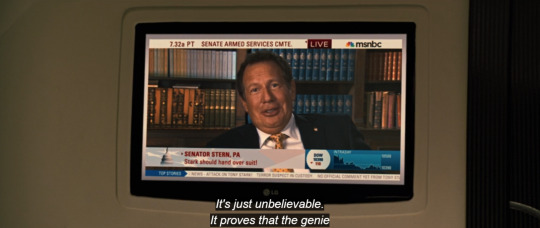
May 25:
Hammer arranges Vanko's escape and brings him to his place. Ivan begins work on drones, his reactor 2.0 and a suit.
Night - Tony searches for information about Vanko after he was declared dead.

Another f*ck up in dates - the screens say 05.06.10. For that to be true, we'd have to move Tony's birthday and change the Expo countdown.
May 29 (Saturday):
Tony's birthday. Blood toxicity - 89%.
10 pm - party.

Rhodey steals Mark II and fights Tony, then flies away.
May 30:
Morning - after ~10 hours of doing something somewhere Rhodes finally brings Mark II to Edwards Air Force Base.

Tony eats donuts in a donut. Fury and Natasha give him a pep talk and lithium dioxide.
Hammer brings Ivan not his bird and notices that he makes drones, not suits.
USAF calls in Hammer to outfit stolen Mark II with his weapons.
Afternoon - Fury tells Tony that Howard was the founder of S.H.I.E.L.D. and gives him a chest of Howard's things.

Evening - Hammer gets his hands on Mark II and turns it into "War Machine".
Tony looks through his father's notes and receives his message recorded in 1973.
May 31:
Morning - Tony goes to apologize to Pepper and finds the "Key to the Future".

Afternoon - Tony (re)discovers a new element and orders components for a particle accelerator. Meanwhile, he drills more holes into his house, eventually turning it into a piece of Swiss cheese.
June 1:
343 days of Stark Expo left.
Morning - Tony builds his particle accelerator. Coulson is reassigned to New Mexico.
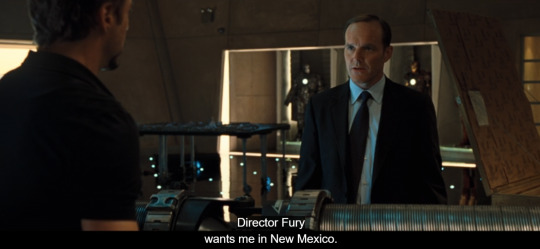
Note: As we've established in Thor's timeline, its events take place in November 2011. Not May/June 2010. I could do some logical gymnastics and stretch it to 2010 (which would already create a mess), but there's no way it could be in May/June.
Afternoon - Tony finishes the particle accelerator and synthesizes the new element at home.

Note: mention of 2010 again.
Evening - Vanko finishes his suit and the drones.

6:20 pm - Vanko calls Tony. Tony heads to New York in the new Mark VI.

40 minutes is most probably an exaggeration, since it is unlikely that Tony could get from Malibu to Flushing in less than 40 minutes. In any case, Tony didn't have time for anything else, especially considering that he needed time to assemble his new suit.

7-9 pm - Hammer and Vanko at the Stark Expo. Tony and Rhodey fight Vanko and defeat him. He blows himself and the Expo up. Tony saves Pepper and 8-year-old Peter Parker. Pepperony's first kiss.


Considering that other things tell us it's been 19 days since Pepper became CEO, Tony's "a week" line is an exaggeration. And Pepper plays along, just like she did with 12% in The Avengers.
I could write a whole post about why it could not be just a week (from Expo opening to the fight) as it's stated in other timelines, but I'll just give you one question to think about: how many days Ivan would need to build all those drones, a new reactor and a suit? Probably not 2.
A week later - Fury gives Tony Natasha's assessment of him and offers him a position as a consultant at S.H.I.E.L.D. Tony accepts.

Mid June - Senator Stern awards Tony and Rhodey with medals.
The Consultant
Second half of 2010:
The World Security Counsel still supports the Avengers Initiative at this point. But they want The Abomination on the team. Coulson and Sitwell send Tony to sabotage the transfer between General Ross and S.H.I.E.L.D. He succeeds, and Blonsky remains in prison.

After that, the WSC loses interest in the Avengers Initiative.
Thor (2011) Timeline
Captain America: The First Avenger (2011) Timeline
The Avengers (2012) Timeline
#marvel#mcu#tony stark#iron man#iron man 2#pepper potts#james rhodes#war machine#ivan vanko#agent coulson#the consultant#mcu timeline#nick fury#natasha romanoff#black widow#peter parker#justin hammer
70 notes
·
View notes
Text
Stephanie Armour at KFF Health News, via AlterNet:
Researchers racing to develop bird flu vaccines for humans have turned to a cutting-edge technology that enabled the rapid development of lifesaving covid shots. There’s a catch: The mRNA technology faces growing doubts among Republicans, including people around President Donald Trump. Legislation aimed to ban or limit mRNA vaccines was introduced this year by GOP lawmakers in at least seven states. In some cases, the measures would hit doctors who give the injections with criminal penalties, fines, and possible revocation of their licenses. Some congressional Republicans are also pressing regulators to revoke federal approval for mRNA-based covid shots, which President Donald Trump touted as one of the signature achievements of his first term. The opposition comes at a critical juncture because vaccines using mRNA have applications well beyond avian flu and covid. They hold the promise of lifesaving breakthroughs to treat many diseases, from melanoma to HIV to Zika, according to clinical trials. The proposed bans could block access to these advances.
MRNA is found naturally in human cells. It is a molecule that carries genetic material and, in a vaccine, trains the body’s immune system to fight viruses, cancer cells, and other conditions. An advantage of mRNA technology is that it can be developed more quickly to target specific variants and is safer than developing a vaccine made from inactivated virus. “Right now, if we had a bird flu pandemic, we would have a shortage of the vaccine we need,” said Michael Osterholm, director of the University of Minnesota’s Center for Infectious Disease Research and Policy. “The one thing that could save us is mRNA vaccine. The challenge would be if mRNA is banned. This is truly dangerous policy.”
The pushback conflicts with innovations championed by Trump. He assembled tech tycoons at the White House just after his inauguration to announce Stargate, a $500 billion artificial intelligence initiative that could help transform cancer treatment by creating tumor-targeting mRNA vaccines. The fledging partnership between Oracle, SoftBank Corp., and OpenAI, co-founded by Elon Musk, envisions leveraging AI in part to improve health outcomes. Patients would undergo blood tests and AI would be used to find cancer.
[...] But some politically conservative doctors, lawmakers, and researchers question the safety of mRNA vaccines, especially covid shots made with the technology. Robert F. Kennedy Jr. unsuccessfully petitioned the FDA in 2021 to rescind approval for covid shots and called them “the deadliest vaccine ever made” — a controversial statement that has been refuted. Now that he’s newly confirmed as Health and Human Services secretary, Kennedy is poised to oversee federal approvals of vaccines, with the power to shape policy such as immunization schedules and appoint vaccine opponents to committees that advise on the approval of shots.
[...] Support for an mRNA ban is coming from other sources too. Florida Gov. Ron DeSantis on March 5 urged the Centers for Disease Control and Prevention to stop recommending the covid-19 vaccine for children and called for a state ban on mRNA vaccine mandates. In February, Rep. Thomas Massie (R-Ky.) said on X that the “FDA should immediately revoke approval of these shots,” and Sen. Ron Johnson (R-Wis.) is leading an investigation into the safety of the vaccines. Trump in February signed an order to strip federal funds from schools that require covid shots for attendance. Vaccine skepticism has become pronounced among Republicans since the pandemic. Four in 10 Republicans who responded to a KFF poll published in January said it was “probably” or “definitely true” that “more people have died from covid-19 vaccines than from the virus itself.” Just a quarter of Republicans reported holding that view in 2023. [...]
Networks of Opposition
Groups opposed to the mRNA technology have built a vast and well-funded legal, marketing, and social media network. Members hold conferences to discuss strategies, fund lawsuits against vaccine mandates, and produce reports on the covid vaccines. As for state legislative efforts, measures introduced this year have varied and their progress has been mixed. Montana’s measure, for instance, was blocked. Idaho lawmakers in February held a hearing on its bill, which calls for a 10-year moratorium on mRNA vaccines. Idaho’s proposal, likely to be amended, as well as Iowa’s and Montana’s have featured criminal penalties for providers who administer all or certain mRNA vaccines. In addition, some state bills, such as legislation in Pennsylvania and Tennessee, focused on the use of the vaccine in livestock and food production.
Various bills are pending in the Texas Legislature to restrict mRNA vaccines in both livestock and humans. South Carolina’s pending bill would require anyone administering certain covid mRNA vaccines to inform patients that the shot is contaminated with fragments of “bacterial plasmid DNA.” Covid mRNA shots may have minute amounts of residual DNA from production processes but they are heavily degraded and pose no risk, according to the Global Vaccine Data Network, which evaluates vaccine safety concerns. Speakers at some legislative proceedings have included representatives from Children’s Health Defense, an activist, anti-vaccine group founded by Kennedy. The Florida surgeon general in January 2024 called for a halt in the use of covid mRNA vaccines. And in Texas, Attorney General Ken Paxton in January moved to appeal a lawsuit he filed claiming Pfizer misrepresented the safety of its mRNA shot. Efforts to restrict the shots have raised the profile of groups such as the Independent Medical Alliance, which advocates for mRNA-based covid vaccines to be withdrawn from the market.
The normalization of anti-vaxxer sentiment in a sizable chunk of the GOP in recent years is leading to disastrous consequences, such as the recent attacks on mRNA technology used for vaccinations.
40 notes
·
View notes
Text
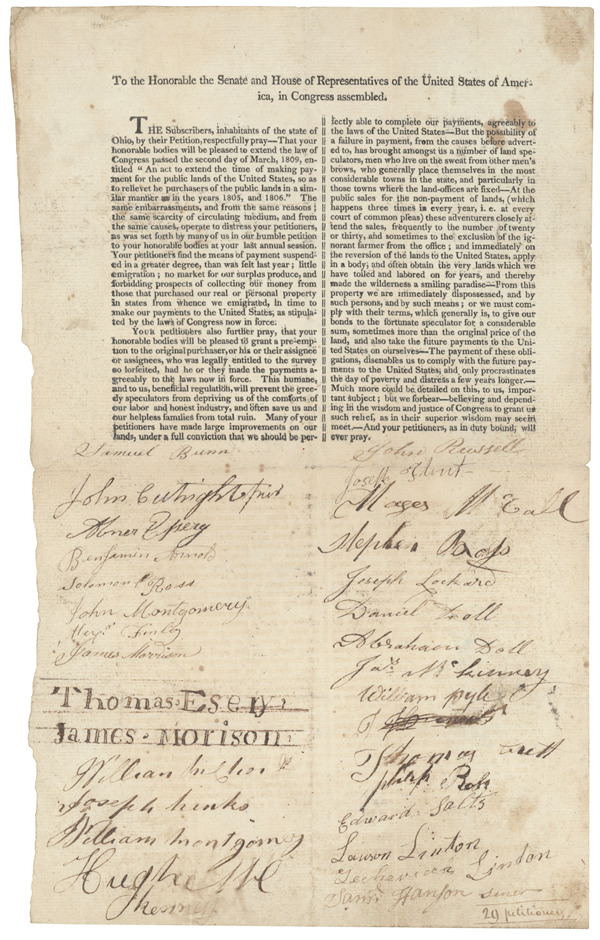
Petition of Ohioans to the Senate and House of Representatives Regarding Land Sale Policy
Record Group 233: Records of the U.S. House of RepresentativesSeries: Petitions and Memorials Referred to the Committee on Public LandsFile Unit: Petitions and Memorials, Resolutions of State Legislatures, and Related Documents Which Were Referred to the Committee on Public Lands during the 11th Congress
To the Honorable the Senate and House of Representatives of the United States of America, in Congress assembled.
[left column]
The Subscribers, inhabitants of the state of Ohio, by their Petition, respectfully pray-That your honorable bodies will be pleased to extend the law of Congress passed the second day of March, 1809, entitle "An act to extent the time of making payment for the public lands of the United States, as as to relievet he purchasers of the public lands in a similar manner as in the years 1805, and 1806." The same embarrassments, and from the same reasons ; the same scarcity of circulating medium, and from the same causes, operate to distress your petitioners, as was set forth by many of us in our humble petition to your honorable bodies at your last annual session. Your petitioners find the means of payment suspended in a greater degree, than was felt last year ; little emigration ; no market for our surplus produce, and forbidding prospects of collecting our money from those that purchased our real or personal property in states from whence we emigrated, in time to make our payments to the United States, as stipulated by the laws of Congress now in force.
Your petitioners also further pray, that your honorable bodies will be pleased to grant a pre-emption to the original purchases, or his or their assignee or assignees, who was legally entitled to the survey so forfeited, had he or they made the payments agreeably to the laws now in force. This humane, and to us, beneficial regulation, will prevent the greedy speculators from depriving us of the comforts of our labor and honest industry, and often save us and our helpless families from total ruin. Many of your petitioners have made large improvements on our lands, under a full conviction that we should be per-
[right column]
fectly able to complete our payments, agreeably to the laws of the United States-But the possibility of a failure in payment, from the causes before adverted to, has brought amongst us a number of land speculators, men who live on the sweat from other men's brows, who generally place themselves in the most considerable towns in the state, and particularly in those towns where the land-offices are fixed-At the public sales for the non-payment of lands, (which happens three times in every year, i.e. at every court of common pleas) these adventurers closely attend the sales, frequently to the number of twenty or thirty, and sometimes to the exclusion of the ignorant farmer from the office ; and immediately on the reversion of the lands to the United States, apply in a body, and often obtain the very lands which we have toiled and labored on for years, and thereby made the wilderness a smiling paradise-From this property we are immediately dispossessed, and by such persons, and by such means ; or we must comply with their terms, which generally is, to give our bonds to the fortunate speculator for a considerable sum, sometimes more than the original price of the land, and also take the future payments to the United States on ourselves-The payment of these obligations, disenables us to comply with the future payments to the United States, and only procrastinates the day of poverty and distress a few years longer.-Much more could be detailed on this, to us, important subject ; but we forbear-believing and depending in the wisdom and justice of Congress to grant us such relief, as in their superior wisdom may seem meet.-And your petitioners, as in duty bound, will ever pray.
[handwritten signatures, left column]
Samuel Bunn
John [Cunningham ? illegible]
Abner Epery
Benjamin Arnold
Solomon Ross
John Montgomery
Alex. Finley
James Morrison
Thomas Esery
James Morison
William [Aniston ? illegible]
Joseph Hanks
William Montgomery
Hugh [? illegible]
[handwritten signatures, right column]
John Russell
Joseph Flint
Moses McCall
[Hephra? illegible] Boyd
Joseph Lockard
Daniel Doll
Abraham Doll
[J ? illegible] Linnary
William Dyk
Thomas Cartt
Joseph Ross
Edward Salts
Lawson Linton
[Gecheviacca ? illegible] Lindon
Sam Hanford Senior
-----------
29 petitioners
-----------
53 notes
·
View notes
Text
man showed up to support an anti-trans bill in my home state and then, because he had to wait hours to testify, he was stuck listening to queer folks rally against it
By the time it was his turn to speak, he'd changed his mind
Lawmakers in Wisconsin are currently debating a piece of anti-trans legislation. Assembly Bill 104 (AB104) is a legislative proposal that aims to prohibit gender transition medical interventions for individuals under 18 years of age.
On Wednesday, the assembly’s Committee on Health, Aging, and Long-Term Carelegislature hosted a hearing. Members of the public showed up to give testimony both for and against the bill.
ACLU Wisconsin says the event went on for over eight hours. Some people had to wait all afternoon to ensure they could voice their opinions.
A speech from one elderly man has now gone viral. ‘Larry’ says he turned up to support the legislation. He had to wait in the overflow room to have his moment to speak.
“First of all, I’d like to apologize to you people,” Larry says when he finally gets his chance to address lawmakers. “I was invited here to give my support for bill 104. I have a very little knowledge of gay people and things like that there. So when I came here, my eyes were opened. I was one of the critics that sat on the side and made the decision there was only two genders, so I got an education that was unbelievable.
“And I don’t know just exactly how to say this but my perspective for people have changed. So I don’t want to take up no more of your time. I’d like to apologize for being here and I learned a very lot about this group of people.”
As Larry gets up to leave, others in the room applaud him.
ACLU Wisconsin has shared the video on its social media channels.
“What a great man. The world needs more Larrys”
“This made me cry,” was one well-liked reply on TikTok. “He showed up. He listened. He learned. He changed his perspective. And then he spoke publicly. That is truly remarkable in this climate. Bravo Larry! I’d love to buy you a beer.”
Another said, “He could’ve just left. But he still chose to speak and publicly admit he had been ignorant on something and had since changed his mind. What a great man. The world needs more Larrys.”
On Instagram, someone else said, “Feeling so honored to have been able to witness his change of heart! This man sat in the overflow room for hours waiting their turn and got to witness beautiful and vulnerable testimony (as well as a lot of unhinged and illogical statements). We love to see growth!”
Someone else said, “There she is, that’s the America I remember.”
AB 104 is sponsored by 30 Republican lawmakers in Wisconsin. The state house has 54 GOP Reps against 45 Democratic. The upper house has 18 GOP senators against 15 Democrats.
As of last December, 26 states have passed laws banning gender-affirming care for minors. Such laws impact around 40% of all trans youth in the country.
#article#LGBTQ#trans rights#government#doom scroll break#hope#collective action#protest#queerty#wisconsin#show up
40 notes
·
View notes
Text
@Real_RobN
And this is,
The irate Katie Hobbs is now officially under criminal investigation for bribery, fraud, conspiracy, and racketeering, This comes after the Arizona Republic detailed how state contractor Sunshine Residential Homes bribed Gov.
Katie Hobbs and the Arizona Democrat Party with $400,000 and in return got millions more in taxpayer money, Sunshine Residential applied for a rate hike in December 2022 was denied in February 2023. It again applied for a rate increase in May 2023 and was approved.
Sunshine CEO Simon Kottoor was on Hobbs' inaugural committee and contributed to her campaign, and his company gave her an award about a month before she stole another election in 2022. Also this comes after Maricopa County Superior Court Judge Scott Blaney ruled Katie Hobbs defied Arizona State law when she circumvented the Senate and nominated directors of statewide agencies without legislative approval, Note: Sen. Ron Johnson and Chuck Grassley sent a letter to FBI Director Kash Patel and U.S. AG Pam Bondi with evidence revealing that the Biden White House directly conspired with Special Prostitute Jack Smith to initiate the J6 sham investigation into President Trump and others under code name —Operation Arctic Frost. — Formed the basis of Special Prostitute false elector case under which President Donald Trump and others were later charged with a conspiracy to defraud the United States for his campaign’s attempts to assemble alternate slates of electors which that the United States government was overthrown during the 2020 election.
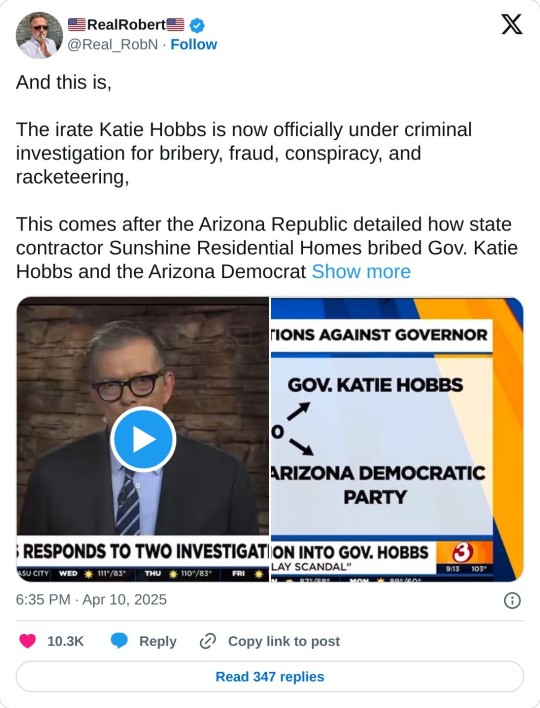
24 notes
·
View notes
Text
The New Yorker Daily: A Win for Democracy in South Korea
E. Tammy Kim Kim writes about politics, the federal government, and the Koreas.
While working on Deep State Diaries, my weekly dispatch about the Trump Administration’s attacks on the federal workforce, I’ve kept my eye on another democracy in crisis: South Korea.
In December, President Yoon Suk-yeol had attempted to thwart the country’s National Assembly, which was obstructing his agenda, by declaring martial law. He censored the media and banned large gatherings; he ordered troops and police to arrest opposition leaders and a leftist journalist. Shoot, if necessary, he demanded. As I wrote at the time, there could have been a massacre—a return to South Korea’s violent, pre-democratic past. (The country was ruled by military dictators from 1961 to 1987.) But the soldiers disobeyed, legislators pushed past guns to vote down the declaration, and thousands of protesters filled the streets. Within six hours, Yoon was forced to call off his plan.
Mass protests continued throughout the winter, calling for Yoon’s arrest and prosecution. He was eventually impeached and indicted for crimes against the state. It was a meaningful step for a relatively new democracy, I wrote. But impeachment does not automatically lead to removal from office. That would be up to the nation’s Constitutional Court, which deliberated for two and a half months. On Friday morning, the justices ruled unanimously (8–0) in favor of Yoon’s ouster. An election for a new President must now be held within sixty days.
I watched Friday’s proceedings on Korean TV: inside the courtroom, there was a quiet, bloodless recitation of treasonous acts; outside, a rowdy explosion of signs, costumes (a giant bear, a red-hatted Mario), song, and dance. Yoon was holed up in his house, where he has long been keeping out of public view. “You, the Korean people, have been through so much,” the head of the impeachment committee for the National Assembly said. He—all the speakers were men, despite the strong presence of young women in the protest movement—invoked a metaphor of rebirth: a “new, democratic spring” was here.
Shortly after the proceedings, workers took down the Presidential flag from Yoon’s official headquarters. Only the national Taegukgi flag remained. There had been a sense, in the lead-up to the court’s announcement, that removing Yoon from office would be a victory for democracy at large. South Koreans needed the win. The rest of us did, too.
22 notes
·
View notes
Text
[OOC] Profile: Atreyu-Cannamos
// CENTRAL COMMITTEE INTELLIGENCE BRIEFING
// SENSITIVE AND CONFIDENTIAL; DO NOT DISTRIBUTE

Full Name: Atreyu-Cannamos
Official Titles: Lord-Discretionary, Cupbearer to the Court Unyielding, Antic to the Court Unyielding
Known Aliases: Leaf (pilot callsign), El-Ahrairah (see profile)
Birthplace: Cannamos Family Estate, Cannamos District, Khayradin
DOB: March 14, 4991u / Feldspar 28, 7564 SR (25 years old)
Parents: Bhodrine-Cannamos (mother), Daomasso-Altia-Seth* (father)
Notes
Born to Bhodrine-Cannamos, the younger sister of Stonelord Hyderad-Cannamos, Atreyu was initially of little note within the Cannamos family. Their father, Daomasso-Altia-Seth, was a minor noble from Seth, a lesser cadet branch of the prestigious and powerful House Altia, who married into the Cannamos family for the purposes of a political alliance.
(NB: it is strongly suspected that the Seth branch is in fact a surviving bloodline of House Ludra, reduced from the rolls after the Free Sanjak rebellion, quietly assimilated into House Altia. Both House Altia and House Cannamos strenuously deny this rumour, dismissing it as vituperative slander by jealous rivals)
Due to the secrecy of the Cannamos household, very little is known about their early life, other than that they were born at nearly the same time as Praya-Cannamos, first-daughter and Graven Heir of Stonelord Hyderad-Cannamos. It is known through a broad spectrum of first-hand accounts and sources that Atreyu and Praya were close friends throughout their respective childhoods, and that Atreyu was subject to close personal attention from Stonelord Hyderad himself.
It is unclear exactly what caused Atreyu to develop Republican sentiments, but the presence of a radical anti-monarchist in the highest echelons of the archconservative House of Stone's nobility was unacceptable to Stonelord Hyderad, who began a public and merciless campaign of public excoriation against his nephew.
Over the course of 5005u to the present, several dozen accounts (some with accompanying audiovisual evidence) of the Cannamos scion being subjected to various humiliations. In one particularly infamous and widely-distributed recording, they are instructed to recite a lengthy Khayradi epic in front of a House gathering, often interrupted from off-screen by Hyderad and a second noble (possibly Ferdinand-Cannamos, younger brother of Hyderad), who alternate between critiquing their pronunciation or prosody of their High Khayradi and asking them to explain how the passage they're quoting disproves Republican dogma.
We suspect that the title of Cupbearer - usually given to a highly-trusted senior member of the house - is another one of Hyderad's punishments, as it requires Atreyu to accompany him on his travels and to wait on him and other House dignitaries at formal events. It would also make Atreyu a prime suspect were Hyderad or one of his associates to die. The title of "Antic" needs little explanation; it is a polite synonym for "jester."
Conclusion
It is the opinion of this analyst that the prolonged and sustained campaign of public humiliation by their House has fatally eroded their familial loyalty. This, in combination with their strong Republican leaning, would potentially make them an excellent agent within the household, provided that a secure line of communication be obtained. With the correct incentives and a reasonable exit plan, they might even be in a position to assassinate key members of the House of Stone should it prove necessary.
Unfortunately, due to the paucity of information from within the household itself, we have little information as to their psychological state or emotional stability. Metrics from similar cases are not promising; more information would most assuredly be needed before a concrete action plan is assembled.
ADDENDUM 1: CRITICAL UPDATE
As of February 2, 5016u, Lord Atreyu-Cannamos of the House of Stone has departed the family estate at the behest of Stonelord Hyderad to attend the prestigious Karrakin Cavalry College. This is an unexpected development, and it presents some interesting challenges and opportunities. While the Karrakin Cavalry College is heavily surveilled, due to its location in Throne Karakiz, it is vastly more accessible than their previous residence.
It should be noted that their only known past associate, Praya-Cannamos, is also attending the College this year. Information on how this relationship has developed over the past ten years is not available to us at this time.
[/ooc]
#house of stone#karrakin trade baronies#lancer ktb#lancer rp#ooc#character profile#atreyu cannamos#shadow of the wolf
33 notes
·
View notes
Text

Nobody
* * * *
LETTERS FROM AN AMERICAN
August 2, 2024
Heather Cox Richardson
Aug 03, 2024
Today, Aaron C. Davis and Carol D. Leonnig of the Washington Post reported that there is reason to believe that when Trump’s 2016 campaign was running low on funds, Trump accepted a $10 million injection of cash from Egypt’s authoritarian leader Abdel Fatah al-Sisi. It is against the law to accept direct or indirect financial support from foreign nationals or foreign governments for a political campaign in the United States.
In early 2017, CIA officials told Justice Department officials that a confidential informant had told them of such a cash exchange, and those officials handed the matter off to Robert Mueller, the special counsel who was already looking at the links between the 2016 Trump campaign and Russian operatives. FBI agents noted that on September 16, Trump had met with Sisi when the Egyptian leader was at the U.N. General Assembly in New York City.
After the meeting, Trump broke with U.S. policy to praise Sisi, calling him a “fantastic guy.”
Trump’s campaign had been dogged with a lack of funds, and his advisers had begged him to put some of his own money into it. He refused until October 28, when he loaned the campaign $10 million.
An FBI investigation took years to get records, but Davis and Leonnig reported that in 2019 the FBI learned of a key withdrawal from an Egypt bank. In January 2017, five days before Trump took office, an organization linked to Egypt’s intelligence service asked a manager at a branch of the state-run National Bank of Egypt to “kindly withdraw” $9,998,000 in U.S. currency. The bundles of $100 bills filled two bags and weighed more than 200 pounds.
Once in office, Trump embraced Sisi and, in a reversal of U.S. policy, invited him to be one of his first guests at the White House. “I just want to let everybody know, in case there was any doubt, that we are very much behind President al-Sissi,” Trump said.
Mueller had gotten that far in pursuit of the connection between Trump and Sisi when he was winding down his investigation of Russian interference in the 2016 election. He handed the Egypt investigation off to the U.S. attorney’s office in Washington, D C., where it appears then–attorney general William Barr killed it.
Today, Brian Schwartz of CNBC reported that Elon Musk and other tech executives are putting their money behind a social media ad campaign for Trump and Vance, and are creating targeted ads in swing states by collecting information about voters under false pretenses. According to Schwartz, their America PAC, or political action committee, says it helps viewers register to vote. And, indeed, the ads direct would-be voters in nonswing states to voter registration sites.
But people responding to the ad in swing states are not sent to registration sites. Instead, they are presented with “a highly detailed personal information form [and] prompted to enter their address, cellphone number and age,” handing over “priceless personal data to a political operation” that can then create ads aimed at that person’s demographic and target them personally in door-to-door campaigns. After getting the information, the site simply says, “Thank you,” without directing the viewer toward a registration site.
Forbes estimates Musk’s wealth at more than $235 billion.
In June the Trump Organization announced a $500 million deal with Saudi real estate developer Dar Global to build a Trump International hotel in Oman.
In January 2011, when he was director of the FBI, Robert Mueller gave a speech to the Citizens Crime Commission of New York. He explained that globalization and modern technology had changed the nature of organized crime. Rather than being regional networks with a clear structure, he said, organized crime had become international, fluid, and sophisticated and had multibillion-dollar stakes. Its operators were cross-pollinating across countries, religions, and political affiliations, sharing only their greed. They did not care about ideology; they cared about money. They would do anything for a price.
These criminals “may be former members of nation-state governments, security services, or the military,” he said. “They are capitalists and entrepreneurs. But they are also master criminals who move easily between the licit and illicit worlds. And in some cases, these organizations are as forward-leaning as Fortune 500 companies.”
In order to corner international markets, Mueller explained, these criminal enterprises "may infiltrate our businesses. They may provide logistical support to hostile foreign powers. They may try to manipulate those at the highest levels of government. Indeed, these so-called 'iron triangles' of organized criminals, corrupt government officials, and business leaders pose a significant national security threat."
In a new book called Autocracy, Inc.: The Dictators Who Want to Run the World, journalist Anne Applebaum carries that story forward into the present, examining how today’s autocrats work together to undermine democracy. She says that “the language of the democratic world, meaning rights, laws, rule of law, justice, accountability, [and] transparency…[is] harmful to them,” especially as those are the words that their internal opposition uses. “And so they need to undermine the people who use it and, if they can, discredit it.”
Those people, Applebaum says, “believe they are owed power, they deserve power.” When they lose elections, they “come back in a second term and say, right, this time, I'm not going to make that mistake again, and…then change their electoral system, or…change the constitution, change the judicial system, in order to make sure that they never lose.”
Almost exactly a year ago, on August 1, 2023, a grand jury in Washington, D.C., indicted former president Donald J. Trump for conspiring to defraud the United States, conspiring to disenfranchise voters, and conspiring and attempting to obstruct an official proceeding. The charges stemmed from Trump’s attempt to overturn the results of the 2020 election. A grand jury is made up of 23 ordinary citizens who weigh evidence of criminal activity and produce an indictment if 12 or more of them vote in favor.
The grand jury indicted Trump for “conspiracy to defraud the United States by using dishonesty, fraud, and deceit to impair, obstruct, and defeat the lawful federal government function by which the results of the presidential election are collected, counted, and certified by the government”; “conspiracy to corruptly obstruct and impede the January 6 congressional proceeding at which the collected results of the presidential election are counted and certified”; and “conspiracy against the right to vote and to have one’s vote counted.”
“Each of these conspiracies,” the indictment reads, “targeted a bedrock function of the United States federal government: the nation’s process of collecting, counting, and certifying the results of the presidential election.” “This federal government function…is foundational to the United States’ democratic process, and until 2021, had operated in a peaceful and orderly manner for more than 130 years.”
The case of the United States of America v. Donald J. Trump was randomly assigned to Judge Tanya S. Chutkan, who was appointed by President Obama in 2014 and confirmed 95–0 in the Senate. Trump pleaded not guilty on August 3, after which his lawyers repeatedly delayed their pretrial motions until, on December 7, Trump asked the Washington, D.C., Circuit Court of Appeals to decide whether he was immune from prosecution. Chutkan had to put off her initial trial date of March 4, 2024, and said she would not reschedule until the court decided the question of Trump’s immunity.
In February the appeals court decided he was not immune. Trump appealed to the Supreme Court, which waited until July 1, 2024, to decide that Trump enjoys broad immunity from prosecution for crimes committed as part of his official acts. Today the Washington, D.C., Circuit Court of Appeals sent the case back to Chutkan, almost exactly a year after it was first brought.
LETTERS FROM AN AMERICAN
HEATHER COX RICHARDSON
#WAPO#bribery#Letters From An American#Heather Cox Richardson#corrupt SCOTUS#Chutkan#certification of the presidential election#voting rights#disenfranchising voters#organized crime
56 notes
·
View notes